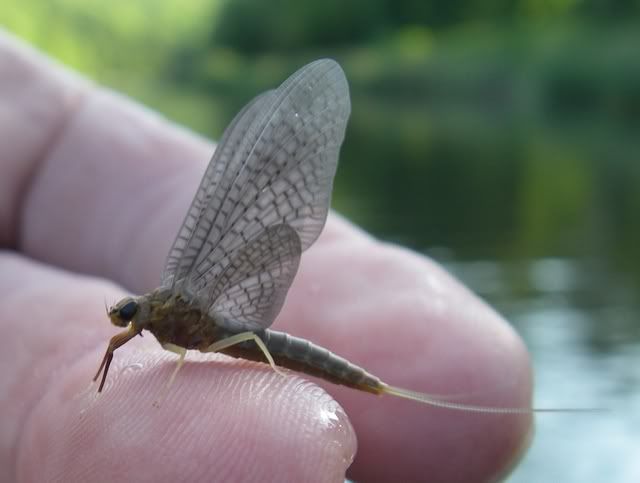Iso flymph
Moderators: William Anderson, letumgo
Iso flymph
If one was going to tie an Iso flymph what colors wold you use? The dry ties I have seen use a claret body, would you use the same?
"I like beer, do you like beer, I like beer a lot."
- letumgo
- Site Admin
- Posts: 13346
- Joined: Sat Feb 21, 2009 7:55 pm
- Location: Buffalo, New York
- Contact:
Re: Iso flymph
VERN-O has an outstanding SH Iso fly. Hopefully he sees this post and can comment on the coloration.
As I remember his fly, it is made with the following:
Hook - Curved 200 (around size 12)
Thread - Black
Tail - Three Pheasant Tail Fibers
Rib - Fine Gold or Copper wire
Back Line - White tying thread (3/0)
Body - Peacock Herl
Hackle - Hen dyed (dark claret)
(keep in mind that this is from my memory, so I may be wrong on the materials list)
As I remember his fly, it is made with the following:
Hook - Curved 200 (around size 12)
Thread - Black
Tail - Three Pheasant Tail Fibers
Rib - Fine Gold or Copper wire
Back Line - White tying thread (3/0)
Body - Peacock Herl
Hackle - Hen dyed (dark claret)
(keep in mind that this is from my memory, so I may be wrong on the materials list)
Ray (letumgo)----<°))))))><
http://www.flytyingforum.com/index.php? ... er=letumgo
"The world is perfect. Appreciate the details." - Dean
http://www.flytyingforum.com/index.php? ... er=letumgo
"The world is perfect. Appreciate the details." - Dean
- William Anderson
- Site Admin
- Posts: 4569
- Joined: Mon Feb 23, 2009 3:14 pm
- Location: Ashburn, VA 20148
- Contact:
Re: Iso flymph
I tied up what I thought would be an Isonychia Flymph last year. It seems like the Iso is one of those flies that can be more complex in its coloration than is usually depicted. I would probably refine this further, but it was a start. It would have to be a drowned dun/cripple/lost emerger as they do crawl to the edge or a rock or something and hatch out of reach. Still, its one of my favorite mayflies.

heres the natural


heres the natural

"A man should not try to eliminate his complexes, but rather come into accord with them. They are ultimately what directs his conduct in the world." Sigmund Freud.
www.WilliamsFavorite.com
www.WilliamsFavorite.com
- letumgo
- Site Admin
- Posts: 13346
- Joined: Sat Feb 21, 2009 7:55 pm
- Location: Buffalo, New York
- Contact:
Re: Iso flymph
Wow! Wonderful pattern William. It looks like your spot on with the flymph pattern. Beautifully tyed, too.
Ray (letumgo)----<°))))))><
http://www.flytyingforum.com/index.php? ... er=letumgo
"The world is perfect. Appreciate the details." - Dean
http://www.flytyingforum.com/index.php? ... er=letumgo
"The world is perfect. Appreciate the details." - Dean
Re: Iso flymph
Thanks William, that looks great.
"I like beer, do you like beer, I like beer a lot."
- William Anderson
- Site Admin
- Posts: 4569
- Joined: Mon Feb 23, 2009 3:14 pm
- Location: Ashburn, VA 20148
- Contact:
Re: Iso flymph
Thanks for the kind words. I can imagine based on the myriad of colors between medium to darker dun wings, brown fore legs and cream hind legs, one could come up with a lot of variations for the materials used. I think this fly is a version of most of the flymphs I tie composition wise, with a size and proportion nod to the natural. It could be taken a step further, but I often ask myself when play around with a fly recipe......WWRD? What would Roy do? The dubbing mix has an uneven mix of brown/olive/maroon and gray hares ear and other fibers. You guys all have a huge influence on what I do when I sit in front of my vise.
I should revisit this one and refine it.
maybe it would better weighted with nymphal coloration.
william
I should revisit this one and refine it.
maybe it would better weighted with nymphal coloration.
william
"A man should not try to eliminate his complexes, but rather come into accord with them. They are ultimately what directs his conduct in the world." Sigmund Freud.
www.WilliamsFavorite.com
www.WilliamsFavorite.com
Re: Iso flymph
Great looking pattern William and fantastic photo of the "Real McCoy". The sharp detail really shows why the Isonychia is also known as the "White Gloved Howdy". Look at the white tips on the forelegs.
John
John
